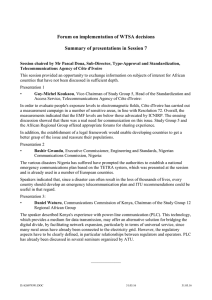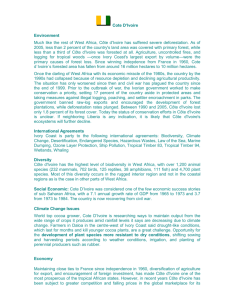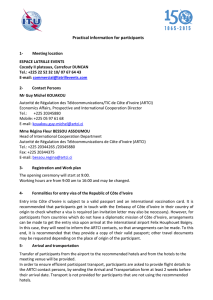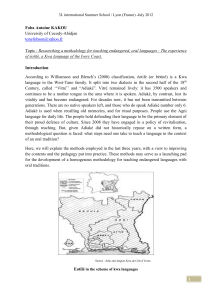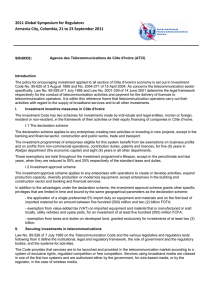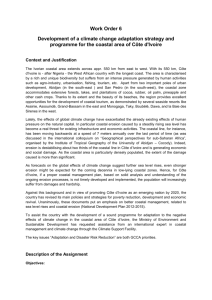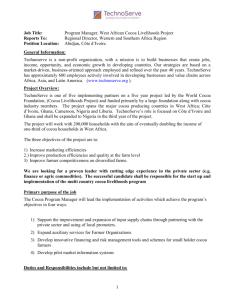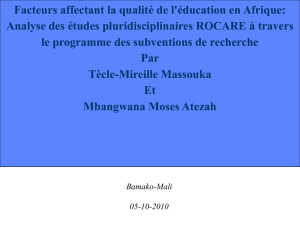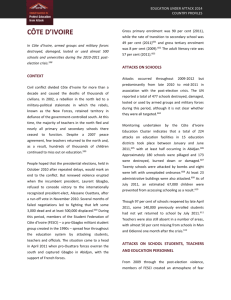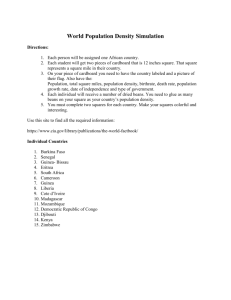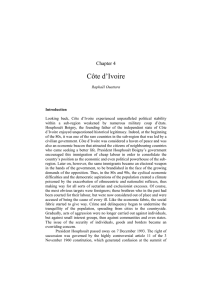E - Office of the High Commissioner for Human Rights
advertisement
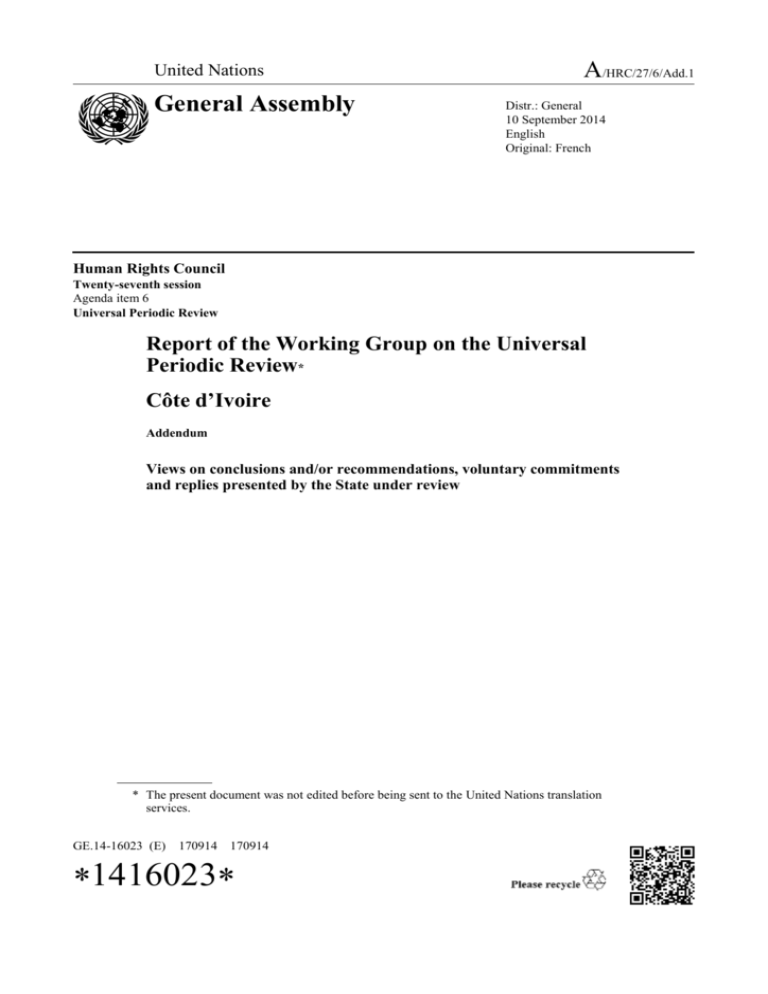
United Nations General Assembly A/HRC/27/6/Add.1 Distr.: General 10 September 2014 English Original: French Human Rights Council Twenty-seventh session Agenda item 6 Universal Periodic Review Report of the Working Group on the Universal Periodic Review* Côte d’Ivoire Addendum Views on conclusions and/or recommendations, voluntary commitments and replies presented by the State under review * The present document was not edited before being sent to the United Nations translation services. GE.14-16023 (E) 170914 170914 A/HRC/27/6/Add.1 1. Pursuant to resolution 16/21 of 25 March 2011 and decision 17/119 of 17 June 2011 of the Human Rights Council, Côte d’Ivoire was reviewed within the framework of the universal periodic review for the second time on 29 April 2014. 2. The delegation of Côte d’Ivoire led by Mr. Gnénéma Mamadou Coulibaly, Minister of Justice, Human Rights and Public Freedoms, introduced a report centred on three core issues: changes in the normative and institutional framework; the response to and implementation of the recommendations and commitments from the first universal periodic review and the State’s expectations in terms of capacity-building and technical assistance. 3. Following that review, 186 recommendations were made to Côte d’Ivoire which accepted 178 of them, deferred 6 and rejected 2. 4. It is therefore happy to have taken part in the exercise, which makes it possible to assess States’ capacity to take ownership of the different mechanisms put in place by the United Nations to promote human rights, the measures taken to put them into effect and the progress made. 5. This report will supply information on the Ivoirian position on the recommendations which were deferred to the twenty-seventh session and those that were accepted. I. Replies on the deferred recommendations 6. During its second periodic review, Côte d’Ivoire asked the Working Group, which agreed, if it could defer its pronouncement on six of the recommendations from nine States. These recommendations were formulated by: • Liechtenstein (128.1); • Slovenia (128.2) and Thailand (128.2); • Czech Republic (128.1); • Latvia (128.4); • Montenegro (128.5), Portugal (128.5) and Republic of Korea (128.5); • Switzerland (128.6). Accession to the international human rights instruments Recommendation 128.1 (Accepted) 7. Regarding this recommendation (128.1), concerning the Kampala amendments relating to the International Criminal Court, it must be borne in mind that it refers to a voluntary commitment by member States to strengthen the Rome Statute system, including its jurisdiction over the crime of aggression. 8. Adopted by consensus on 11 June 2010 by the States present in Kampala, the crime of aggression will effectively come under the Court’s jurisdiction only as of 1 January 2017. Côte d’Ivoire acceded to the Rome Statute on 15 January 2013 and intends to continue its cooperation with this important instrument in the fight against impunity. 9. Accordingly, it undertakes to adopt the necessary measures to extend the Court’s jurisdiction to crimes of aggression. The same goes for the amendment extending to noninternational conflicts the ban on certain weapons already applicable to international conflicts. 2 GE.14-16023 A/HRC/27/6/Add.1 Recommendation 128.2 (Accepted) 10. In ratifying the Convention on the Rights of the Child in February 1991, Côte d’Ivoire undertook to make respect for children’s rights a tangible and everyday reality. It is in this spirit that it ratified the Optional Protocol on the involvement of children in armed conflict and the Optional Protocol on the sale of children, child prostitution and child pornography. 11. Hence, approval of this third optional protocol establishing a reporting procedure will further strengthen the Ivoirian legislative framework for child protection, insofar as it enables children and/or their representations to bring individual complaints before the United Nations Committee on the Rights of the Child. Côte d’Ivoire therefore has no objection to its ratification. Cooperation with treaty bodies and special procedures Recommendation 128.3 (Accepted) 12. Concerning this recommendation (128.3), Côte d’Ivoire would like to note that it is well aware of its considerable delays in reporting to the treaty bodies. That problem will be addressed by the establishment, in the very near future, of an interministerial commission to draft reports in keeping with its international human rights commitments, as the Government promised during its recent periodic review. 13. In addition, regarding the definition and criminalization of torture in Ivoirian criminal legislation, in accordance with the provisions of the Convention against Torture, the current recasting of the usual codes will address this concern. Recommendations 128.4 and 128.5 (Rejected) 14. Regarding these recommendations (128.4 and 128.5), Côte d’Ivoire would like to point out that it has never refused any Human Rights Council special procedures mandate holder access to its territory nor sent away a special procedures mandate holder. 15. However, in order to maximize these special procedures mandate holders’ chances of success, it would like requests to be made on a case-by-case basis for purposes of analysis. Consequently, it cannot respond favourably to standing invitations to the special procedures. 16. In this regard, it should be pointed out that Côte d’Ivoire displays excellent cooperation and responsiveness to the special procedures by responding favourably to the requests to visit from all mandate holders who submit them, including the Special Rapporteur on the human rights of internally displaced persons, the Special Rapporteur on the human rights of migrants, the Special Rapporteur on the promotion of truth, justice, reparation and guarantees of non-recurrence, the Working Group on the use of mercenaries as means of impeding the exercise of the right of peoples to self-determination. Equality, non-discrimination and protection of vulnerable persons Recommendation 128.6 (Rejected) 17. As for recommendation 128.6, Côte d’Ivoire would have preferred it to be split into two, separating LGBTI persons from AIDS patients. In any event, it would point out that AIDS patients enjoy special protection in terms of both social protection and health care. GE.14-16023 3 A/HRC/27/6/Add.1 18. In fact, Côte d’Ivoire has HIV/AIDS units in its main hospitals. Even more to the point, it subsidizes the antiretroviral therapy so that HIV patients have to spend a mere 1,000 CFA francs per month (less than 2 euros a day). In July 2014, Parliament passed a bill governing prevention, protection and punishment in the fight against HIV/AIDS, which provides for the rights of persons living with or affected by HIV. 19. At the same time, without being a homophobic country, Côte d’Ivoire does not accord more rights to LGBTI persons than to other citizens. The Ivoirian Criminal Code does not punish sexual relations between consenting adults. 20. However, under positive law as it currently stands in Côte d’Ivoire and when it comes to people’s attitudes, this recommendation would fail if it were to be kept as is. II. Progress on the implementation of the accepted recommendations 21. The recommendations accepted by Côte d’Ivoire following its second universal periodic review are divided among the public and semi-public services potentially responsible for their implementation. At the end of this process, a wide-ranging return and awareness-raising campaign, including civil society, will be held. The follow-up committee, assisted by the “human rights” focal points in ministries and public institutions, will monitor implementation. 22. In any event, it should be noted that since the last review of Côte d’Ivoire various measures have been taken with a view to the implementation of the accepted recommendations. 23. The most outstanding are: Normative and structural human rights protection framework: • Promulgation of the Act on the reform of the Independent Electoral Commission the elected members of which come not only from the party in power, but from the opposition and civil society; • Adoption of a communication on girls’ entry into the National Gendarmerie from the beginning of the 2015/16 academic year. The quota reserved for women for the Gendarmerie competition will be 10 per cent for officers and non-commissioned officers. Justice, fight against impunity, and security: • Pursuit of the process of national reconciliation. Investigations have taken place on the ground to determine the responsibilities and the harm suffered by the victims of the crisis. To this end, the Dialogue, Truth and Reconciliation Commission is preparing to start up public hearings. 24. Côte d’Ivoire would like, under this review, to thank the international community again for its support and request it to continue to sustain it on its path towards reconstruction and consolidation of the rule of law, and promises to produce a report halfway through 2016 on the effective implementation of the recommendations made during the universal periodic review of April and May 2014. 4 GE.14-16023
